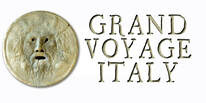|
No Sh*t. This is a messy story about a messy city. DNA samples will be taken by special city poop inspectors. Who wouldn't like that job. Wonder if they work by commission or by the kilo? --from Mother Nature Network
In an Italian city struggling with debt, pollution and a mafia-run waste disposal industry, officials turn to DNA testing to help deter poop-scoop negligence amongst dog owners. It would appear that city officials in Naples, the gritty Italian port city best known for its pickpockets, pizza, and horrendous garbage problem, are really laying down the law when it comes to animal waste that’s been left to bake under the Mediterranean sun on city sidewalks by neglectful dog owners. As reported by the New York Times, Naples has launched a DNA database to help police nab — and fine —scofflaws who habitually fail to retrieve and properly dispose of canine cacca. While the scheme is now in its infancy, officials hope to eventually build a database of all the roughly 80,000 dogs in the city, allowing them to easily match an offending poop with an irresponsible person: The idea is that every dog in the city will be given a blood test for DNA profiling in order to create a database of dogs and owners. When an offending pile is discovered, it will be scraped up and subjected to DNA testing. If a match is made in the database, the owner will face a fine of up to 500 euros, or about $685. If this all seems vaguely familiar, it’s because some poop-plagued condo associations and apartment rental complexes in the U.S. and elsewhere have also started to employed similar DNA matching services to help put the fear into residents prone to scoop-shirking. In the seaside community of Ipswich, Mass. one super-fired-up — or "rabid" as one anonymous resident puts it — animal control officer is pushing for the town to invest in a DNA database that would enable him to go after offenders. But dog feces-based forensics in a bustling city — Italy’s third largest — of over 960,000 residents is an entirely different creature to be sure. And officials such as vice mayor Tommaso Sodano are very well aware of this. “I know some people find it funny that with all the problems the city has, we would focus on dog poop. I know that,” Sodano explains to the Times. Responding to critics who believe that the campaign is an egregious waste of money and resources, Sodano fully admits that Naples has larger and more pressing issues to tackle than deterring dog poop — issues like a crumbling infrastructure, political corruption, and, of course, the Camorra crime syndicate. But he believes that efforts to make the debt-ridden city more beautiful and “demonstrate municipal solving problem” are also important. To date, the campaign has taken effect in the well-heeled hillside quarters of Vomero and Arenella where plainclothes police officers and city health workers take to the streets with a watchful eye for errant turds — or “presences” as Enrico Del Gaudio of the Municipal Police refers to them. “Now, when I walk the streets, the presences have greatly diminished,” Del Gaudio explains of the campaign’s success thus far. “Before, it was like an obstacle course. Every day, a child would walk into school with a little gift under her shoe.” While officials continue to build their DNA database, the city’s veterinary hospital is busy taking blood samples from pooches to add to the registry — about 200 dogs are accounted far thus far. And for the most part, residents who bring their dogs in for testing are supportive of the campaign. Or at least they’re pretending to be supportive. Says dog owner Maria Teresa Ceccarelli: “It’s really disgusting. I don’t see people walking their dogs. I just see the results in the street.” Via [NYT] --Matt Hickman
0 Comments
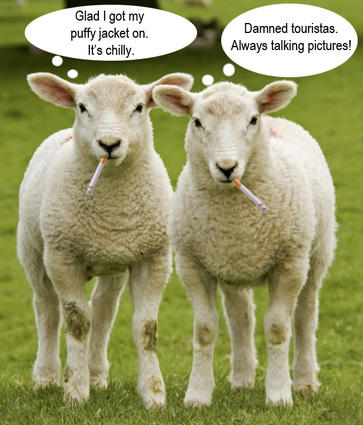 Here is an odd tale.... or tail, should I say. It's a tale of a visitor going to Italy and finding out that animals talk, screech, bark and chirp differently there. On my first day waking up in the agritourismo, I heard a welcome country sort of sound. To me, I heard, "Cock-a-doodle-doo!). Obviously a rooster waking with the sunrise. When I mentioned it to the padrone later on, he nods his head and says, "Si, that was the gallo with his morning 'chicchirichí'"! (kee-kee-ree-keee). "Ok", I nod. So he takes me over to his hen house. They produce organic eggs here, too. There are lots of chickens going "cluck, cluck, cluck", or so I thought. He says "I like-a to hear my galline (hens) laying eggs and saying coccodè" ("cock-o-day"). Then I know-a they are-a happy". Ok. Then he shows me their chicks in a sort of incubator setup to keep them warm. Lots of cheep, cheep, cheeps going on. He picks up one and cups it in his hand and mimics "Ahh, piccolo pulcino, pio, pio, pio". (pee-o, pee-o, pee-o). Uh huh. He suddenly spied a hole down near the floor where a tiny mouse got in and is eating some feed. "Squit, squit, squit" he says as he tries to land a shovel on top of the little guy. All I heard was a "squeak, squeak" as the mouse disappears into a crack. "He's-a mangia here every day... piccolo topo demone!" We walk down toward his field and one of his donkeys is having a little hissy fit... "eee, aww, ee, aww!" He goes right up to him, pats him on the rump and says "i-oo, i-oo (eee-oo, eee-oo), mio asino, calma, calma." I picture Shrek's buddy as I watch him calm right down and start nibbling on a weed. He wanted to show me his bee boxes near the pond, and as we get close I hear a "ribbit, ribbet". He notices me looking for the source of the croaking and says, "Ahh le rane... cra, cra! Over near-a the water." I see some crows passing overhead and of course he looks up and says "Ahh... Il corvo... cra, cra, cra". Mmmm.... In Italy I suppose frogs and crows are some sort of cousins. There are lots of cousins in Italy. Onwards toward the bee boxes, when I hear a wayward sheep say "Baa". Padrone mimics again.... "Hey, get back over there, mia pecora.... Bee... beee!" grabs him by his wool and lifts him back over the fence into the field. "Bee?" Does the sheep know we're going to see the bees? Somehow, I don't think so. We get to the bee boxes and all I hear is "Bzzz... Bzzzzz" while he lets out, "zzzz.... zzzz... zzzz... see the ape? They won't sting. No worry We make-a our own miele here too!" Then the goose on the pond let's out a "Honk, Honk" and he answers back "Qua, Qua, oca!" and throws a crust of bread he had in his pocket to the long necked beauty. As we wandered back around the main field and on toward the main house, I saw some cows laying down near the fence with a cat playing around their tail. Then he points amused and says "Look-a, the gatto, she plays with-a the mucca... miao, miao... MUuuuuuu...." At least some animals around here talk English! As I get back to my little stone cottage, one of the many dogs on the farm runs up to me and barks, "bau bau!" Wait a second. I'm actually starting to get the hang of this language! "Here boy", I call... "venire qui, cane... bau, bau!" I give him a piece of sausage from my pocket. (Where'd that come from?) (Gotta remember to buy some of that miele before I leave). --Jerry Finzi You can also follow Grand Voyage Italy on: Google+ StumbleUpon Tumblr Here's some amazing views of the rugged, unbelievable landscape of the Amalfi Coast and its towns... Enjoy this little postcard. Arrivederci e la pace... I don't know about other parents, but in our little famiglia we are inseparable--we love being together. That's a big plus when you commit to being stuck on planes, trains, automobiles and in small apartments or hotel rooms together. But we planned well, we have a great kid in Lucas, and he helped us know what his needs were as we went along. So, here's some lessons learned--mostly Lucas teaching us--that might help with your family's trip to la Bella Italia. Food: Thankfully, if you have a child who wasn't raised on McDonalds, take-out or Chuck-e-Cheese pizza, Lunchables and Pop Tarts, you are ahead of the game, as we were with Lucas. So far, the only food he balked at was a whole lobster staring him in the eye up in Mystic, Connecticut. We were right in thinking Italian cuisine would not be a concern for Lucas. So, what will keep your kiddie well fed?
Entertainment: Electronics. By all means, this is no time to limit their iPod or smart phone use. Before you leave home, let them shop for and install some new games. Lucas kept one of our Kindles in the back seat of our car with Minecraft to keep him from getting bored. And he still put it down when passing by beautiful vistas, castles, and through crazy, windy roads like in Amalfi. Here's what tech things helped him from getting bored:
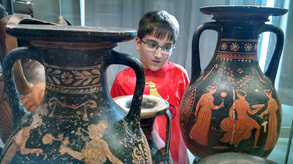 Contemplating the past at Ignazia Contemplating the past at Ignazia Education (disguised as FUN): This is tricky. If you make them think you are going someplace just for their education, they'll shut down and act bored. We let Lucas choose some of his "must see" places while we were planning the trip. The Leaning Tower of Pisa and the Da Vinci Museum in Vinci were his top ones. Here are some other ideas from our trip:
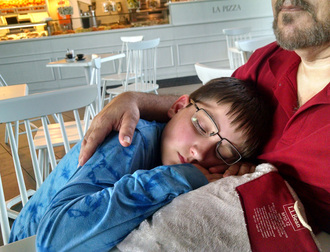 Jet lag napping after a car to the plane to a taxi to the train. Jet lag napping after a car to the plane to a taxi to the train. Resting: Basically, we had a talk to Lucas before the trip and told him that when he felt tired, not to fight it and have a catnap. This helped prepare him, so when in the car, he would nap for a short while then feel refreshed. Once in a railway station he was so exhausted, he gave in to my pleading just to lay his head down on his rolled up jacket right at our cafe table. He was out like a light for about 1/2 an hour which really helped him. More ideas:
ACCOMMODATIONS:
TRANSPORTATION:
I hope this helps you plan for a trip with your kids. Kids are flexible when they fall, and very flexible when they travel. Besides, give your kids a trip to Italy and it will change their lives forever.
--Jerry If you like this post, please COMMENT and SHARE it with your friends! And please, stop by our SURVEY and spend 60 seconds telling us how we could make our blog better! Grazie! Tamborello (hand drum) and Zampogna (Italian bagpipe). Enjoy! A vintage film of an authentic spaghetti harvest. Enjoy! If you like this post, please COMMENT and SHARE it with your friends! And please, stop by our SURVEY and spend 60 seconds telling us how we could make our blog better! Grazie!
--Jerry Finzi
If you like this post please SHARE it with your friends and leave a comment! Ciao! And please, stop by our SURVEY and spend 60 seconds telling us how we could make our blog better!
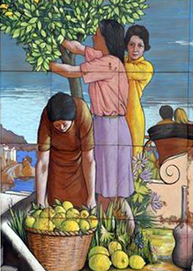 Lemons were well known to the Romans and Amalfi lemons were being tasted and written about in the 1600s. They were used on ships to prevent scurvy outbreaks. From this time onwards, lemon cultivation on a large scale transformed the rugged cliff sides of Sorrento and Amalfi into the terraced groves and villages that we see today. Production and harvesting was a village wide occupation, with women carrying loads of lemons as heavy as 100 pounds in baskets on their shoulders down--or up-to their village. Considering the steep steps and paths that wind their way throughout the rugged coastline, the cultivation was--and still is--a monumental task. The port town of Minori shipped lemons to all parts of Italy.
Ok, so I thought for those of you who would like to try and have your own Amalfi adventure, I'd post a recipe for Limoncello... Ingredients for Amalfi Limoncello 10-12 organic lemons (you'll use the skins) 1 quart pure grain alcohol (or Vodka) 2 quarts water 3 cups of sugar Directions
There you have it... enjoy, and cent'anno! --Jerry Finzi If you like this post, please COMMENT and SHARE it with your friends! And please, stop by our SURVEY and spend 60 seconds telling us how we could make our blog better! Grazie! 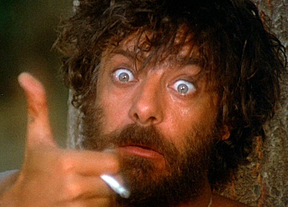 Giancarlo Gianini Giancarlo Gianini We've all seen Italians talking with their hands, waving them wildly in the air, sometimes right into the face of the person they are talking to. To the onlooker it seems random, yet it does seem tied into their facial expressions, which will change swiftly depending on the gesture being used. It's led people to paint a caricature of every Italian, although most Italian Americans don't have a clue about this unwritten language. Yes, it's a language in and of itself. 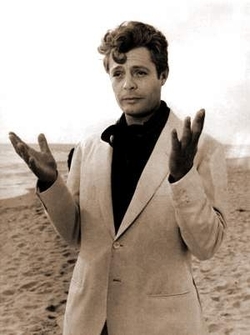 Marcello Mastroianni Marcello Mastroianni Where did it start. What's the reason? It more than likely started in the port cities of Italy after the Roman Empire. I say after, because before that Latin was a widely spread language. After the fall of the Roman Empire, imported languages started taking over, as conquerors and immigrants came from many different parts of the ancient world: The Carolingians (mixing early German and French into northern Italy), The Visigoths (mixing German, Spanish and French), the Normans (descending from Vikings from Northern France, they took over Southern Italy), Saracens (Muslims that invaded southern Italy and settled in Sicily), the German tribes (in pre-Christian times and in the middle ages), French (taking over northern Italy in the 1400s) and Austrians. leaving Latin behind. Latin itself morphed into what we now call the Italian language. But even "modern" Italy didn't become a cohesive nation until the 1860s, and still today Italians are very region-centric, with many varied dialects still spoken throughout the country. One example I witnessed is on the train from Bari to Rome. The announcements were in three languages: English, Italian and Southern Dialect. And believe me, Dialect sounds very different than "proper" Italian--my Dad spoke it. My Mom couldn't understand him. Again, the port cities, like Naples, Venice, Bari or Palermo needed a way to communicate with the many different people, all speaking different tongues. Every so often a a new population and ruling class would be established, depending on who the conqueror was. Hand gestures became a necessity in Italy, and it remains today a large part of how people communicate. For this reason, this might make things easier on travelers to Italy as Italians have many ways of getting people to understand what they are saying. Finally, here is a charming Italian gent illustrating the many subtleties of hand gestures. You could learn to have an entire conversation without words! If you like this post, please COMMENT and SHARE it with your friends! And please, stop by our SURVEY and spend 60 seconds telling us how we could make our blog better! Grazie! |
Categories
All
Archive
June 2024
|


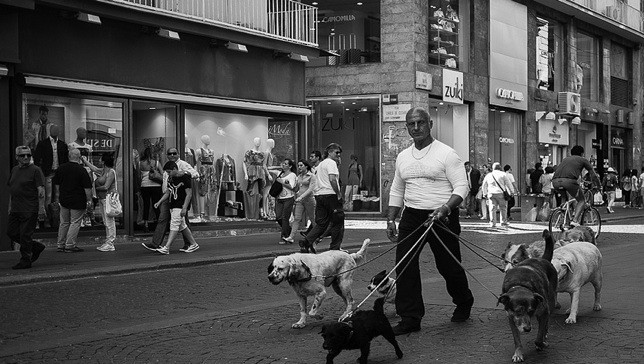
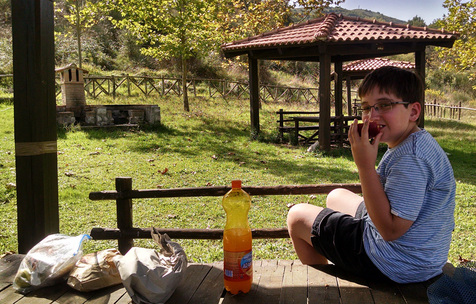
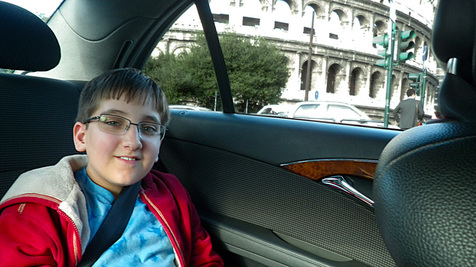
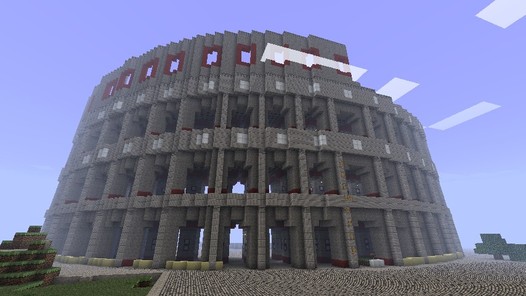
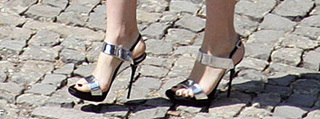
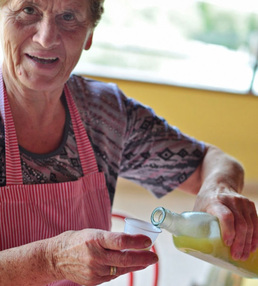
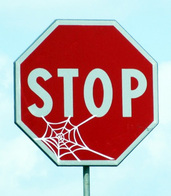


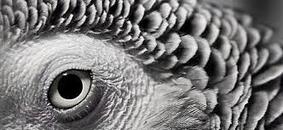

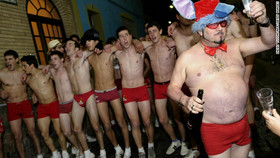

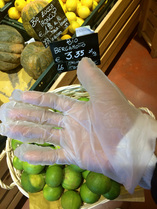
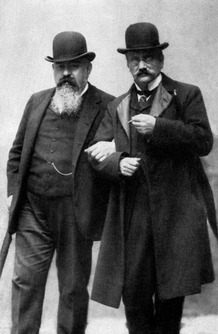

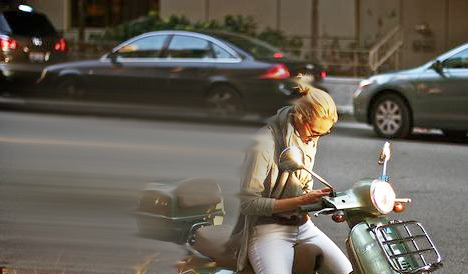
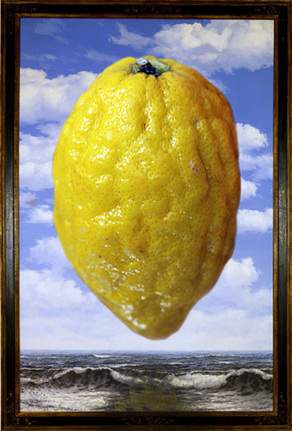
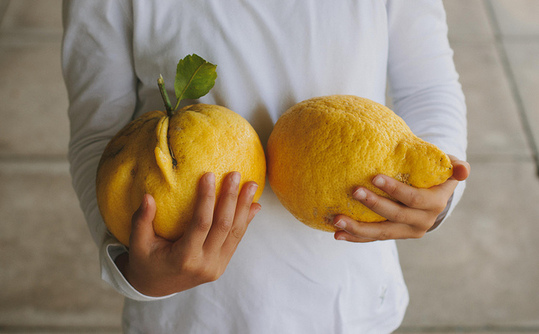
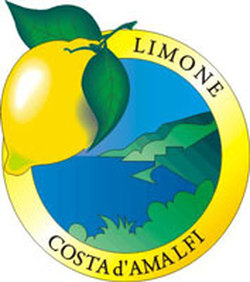
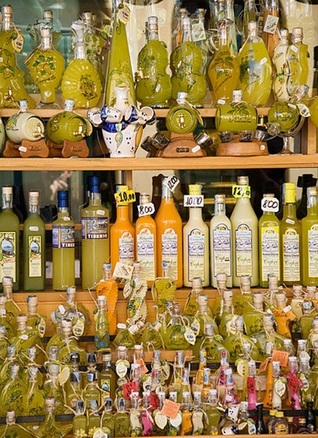
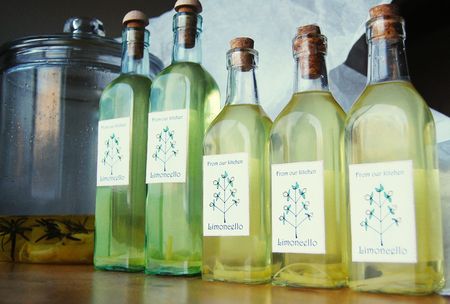
 RSS Feed
RSS Feed
